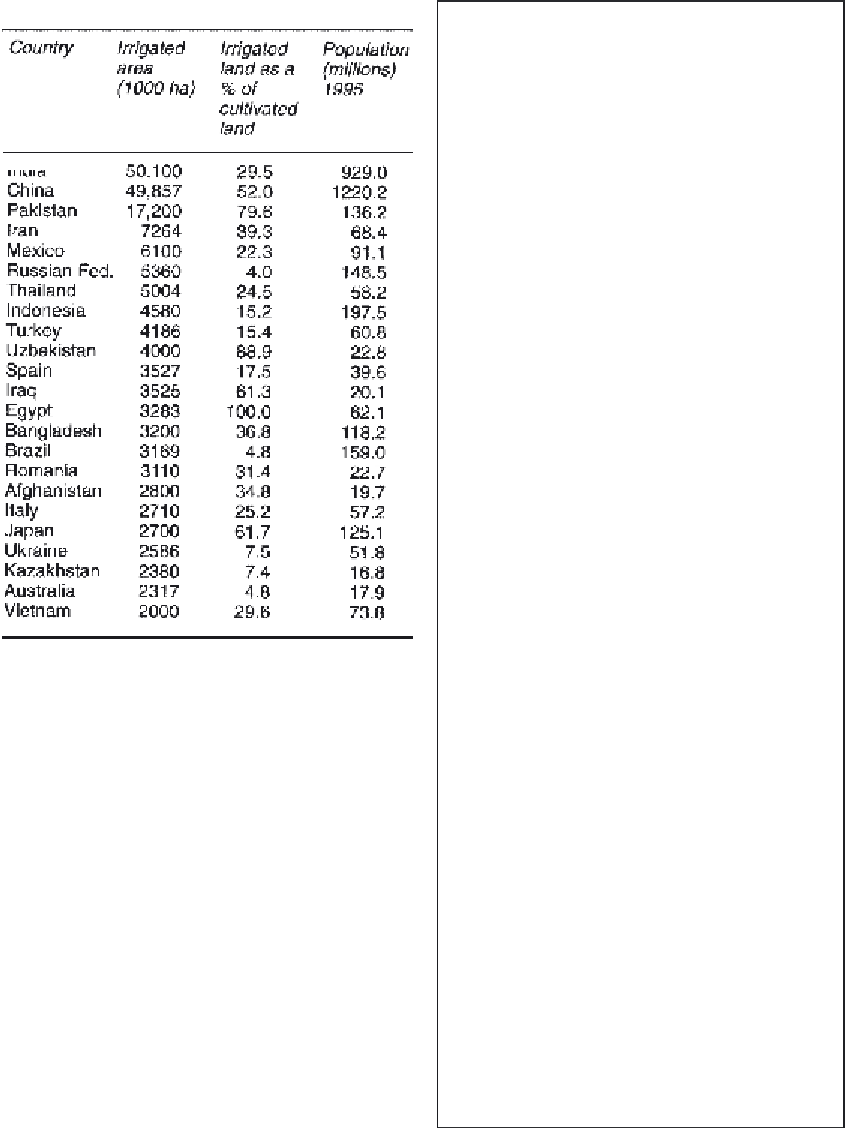Geography Reference
In-Depth Information
Table 12.1
World irrigation by country, 1995.
Box 12.1
The Bureau of Reclamation and the
American West
In 1902, the Reclamation Service, later to be known as
the Bureau of Reclamation, was established through
the Reclamation Act. The main contribution of the
Bureau of Reclamation to the opening up of the west
was that it injected large capital sums, introduced
modern engineering techniques and possessed a
bureaucracy that was capable of building large-scale
irrigation projects and advocating the construction of
others. As an organisation, it was sufficiently large and
powerful to overcome any objections that might be put
in its way. Between the Reclamation Act in 1902 and
1920, 0.89 million hectares were developed into
irrigated lands, and by the end of the Second World
War this figure had grown to 1.68 million hectares.
However, the really rapid increase in the Bureau's
activities took place between 1945 and 1965, when
1.62 million hectares of irrigated land were
commissioned, producing a total of 3.24 million
hectares (National Water Commission 1973).
Thereafter, the pace of development slowed down and
by 1981 had only reached 4.09 million hectares.
The Reclamation Reform Act of 1982 attempted to
redress many of the problems that had arisen over the
years as the scale of irrigation operations had
increased. However, well before the enactment of the
Reclamation Reform Act, times were changing for
irrigation in the American west. The last major
authorisation of funds for major construction works by
the Bureau of Reclamation took place in the late 1960s
at a time when a growing environmental movement in
the USA was expressing opposition to water
development projects. From then on, it effectively
ceased to be a major construction organisation and
instead became more concerned with the operation
and maintenance of existing facilities. The bureau
wrote: The arid West essentially has been reclaimed.
The major rivers have been harnessed and facilities are
in place or are being completed to meet the most
pressing current water demands and those of the
immediate future.' These changes were acknowledged
between 1988 and 1994 by a major reorganisation and
slimming down of the Bureau of Reclamation at a time
when the last major projects, which had been
authorised in the 1960s, were finally being completed.
Although the Bureau of Reclamation is now a much
smaller organisation than previously, it still operates
around 180 projects in the seventeen western states of
the USA, which represents a total investment of around
US$ 11 billion. Water from Bureau of Reclamation
projects continues to irrigate 3.68 million hectares
(1992), which amounts to about 20 per cent of the total
irrigated area in the region. The overall impact of the
Bureau of Reclamation on irrigation development in the
American west has been enormous. Its own projects
are impressive in their own right, but it is important to
remember that the mere existence of the bureau has
had an important catalytic effect on the development of
irrigation in general throughout the southwest by private
individuals as well. In reality, the Bureau of Reclamation
has been an 'irrigation flagship' with a reputation that
has spread around the world.
Source:
FAO Production Yearbook 1996.
into the aquifer, but at least it allowed the state to
create a pattern of Jewish rural settlement that
spread to cover a large area of the new state. With
the completion of the National Water Carrier in
the late 1960s, water from the River Jordan was
used to recharge the depleted and overused aquifer
systems.
As a result of this policy, the area of irrigated
land grew rapidly and with it the demand for
water. Water used for agriculture increased from
less than 300 million m
3
per annum in 1949 to
around 1400 million m
3
by the end of the 1980s
(Figure 12.4). Since then, it has begun to decline
as water has been diverted away from agriculture
to other sectors of the economy. Even in the
1990s, it is interesting to note that Israel continues
to produce 'realities on the ground' by its
continued
policy
of
encouraging
the

